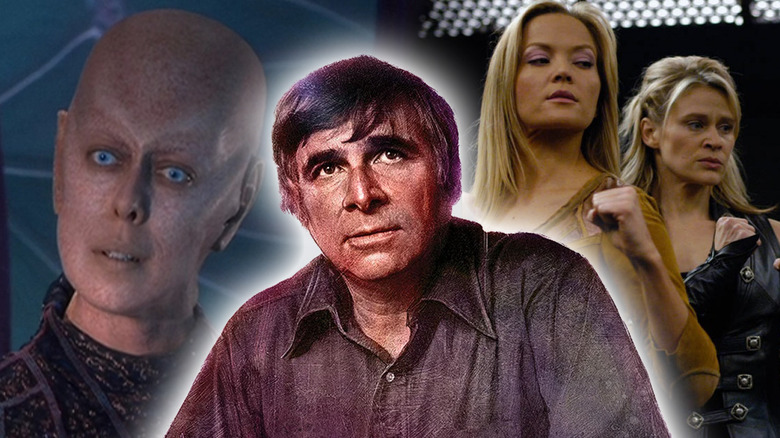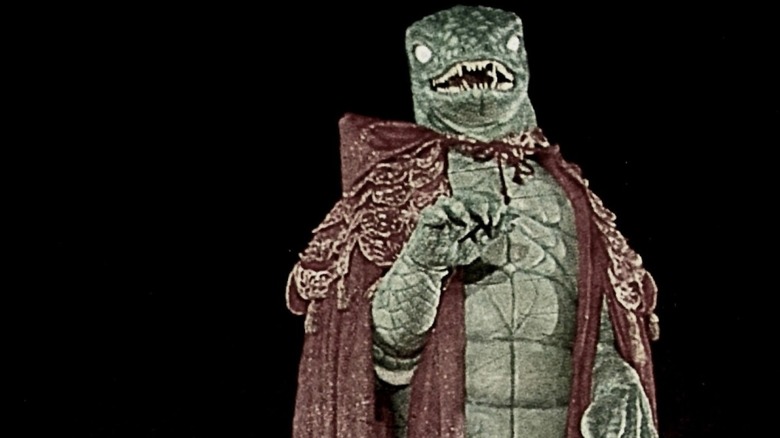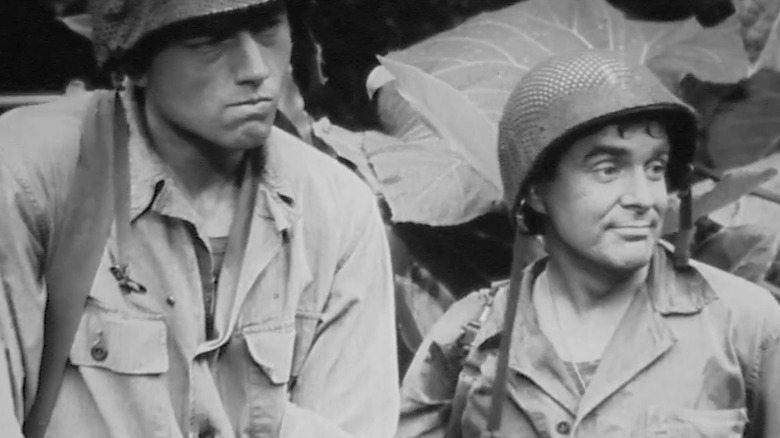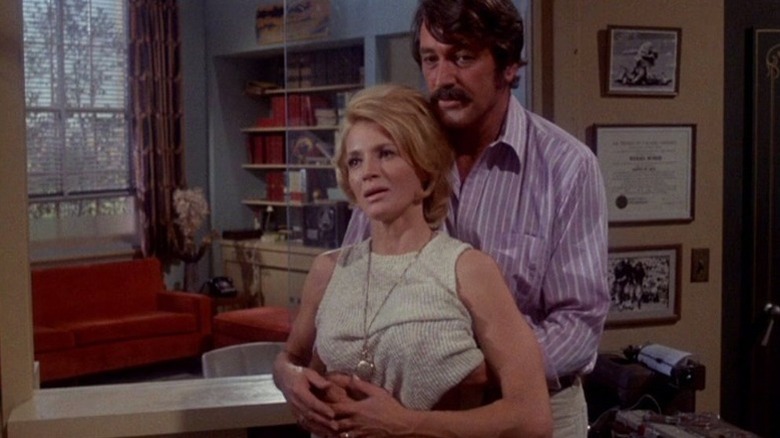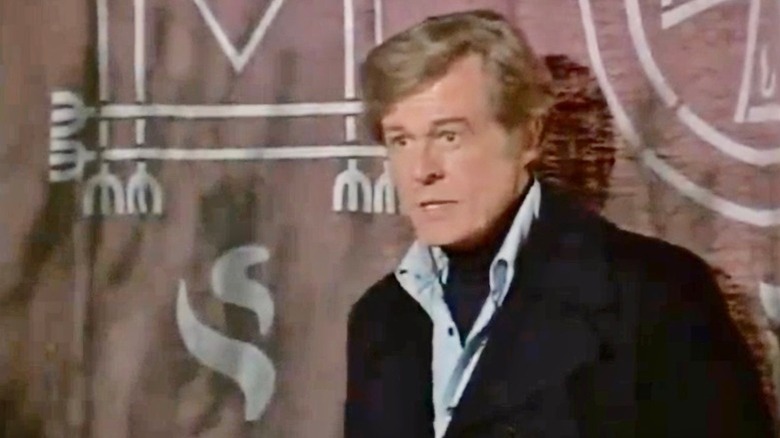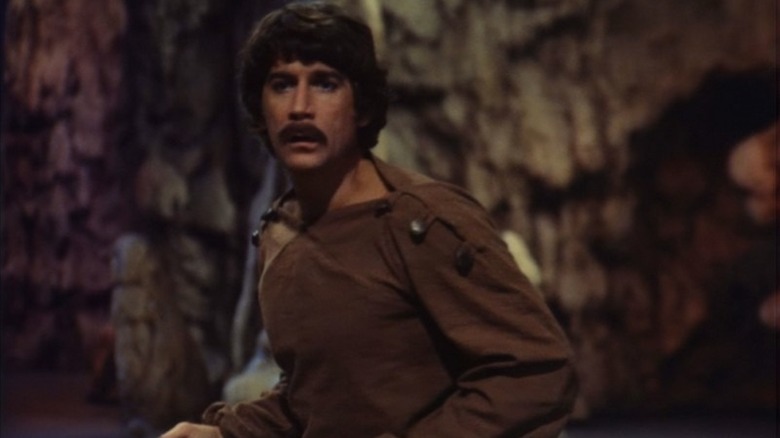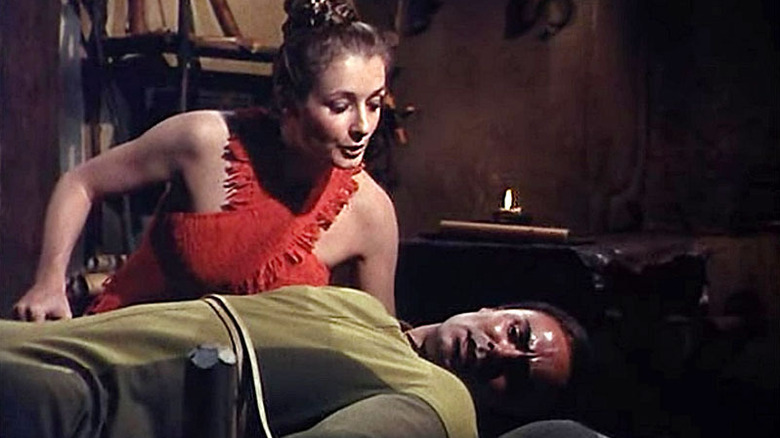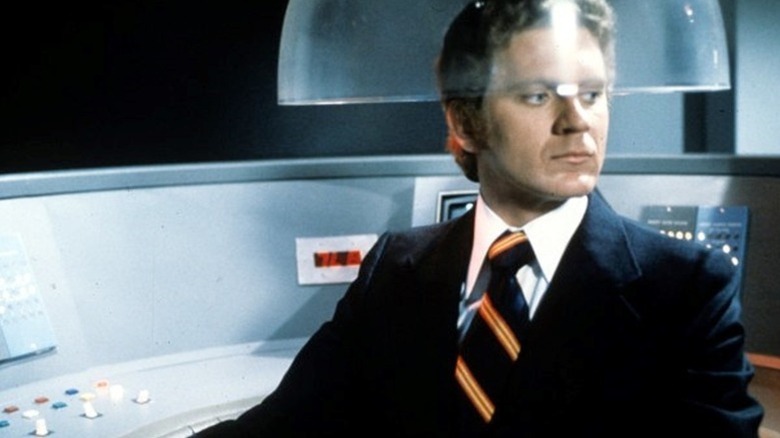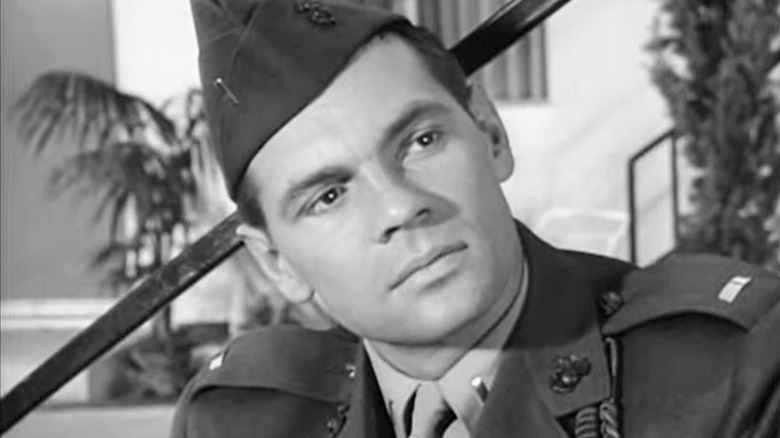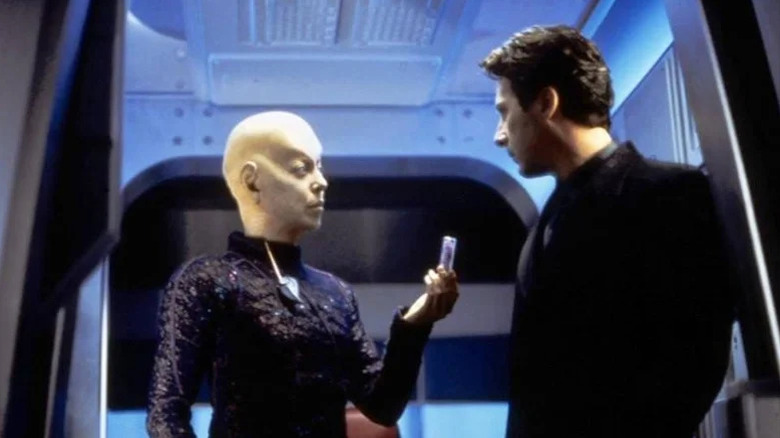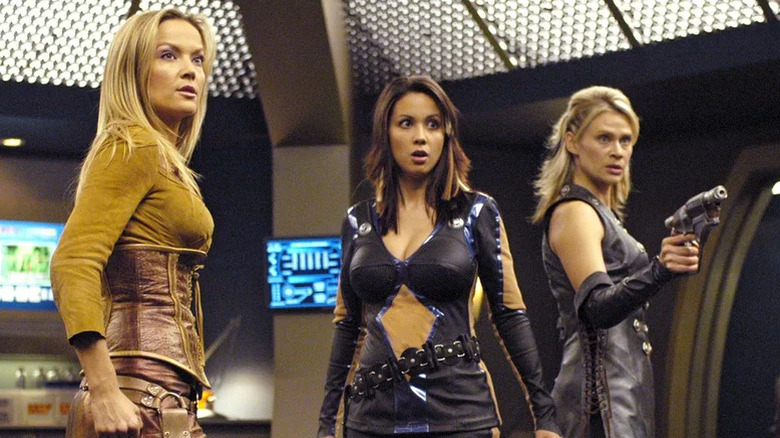Gene Roddenberry's Non-Star Trek Projects, Ranked
Just as "Star Wars" has George Lucas, "Star Trek" has Gene Roddenberry as its visionary creator who brought its iconic science fiction world to life. Giving birth to "Star Trek" was a true labor of love for Roddenberry, though "The Original Series," as it came to be known, only ran for three seasons. However, as "Star Trek" found a new audience and grew, Gene Roddenberry landed a Hollywood first for his creative contributions, with television creators becoming actively associated with their properties. Roddenberry went on to successfully revive the franchise on television in 1987, though he only agreed to create "Star Trek: The Next Generation" in a fit of rage.
But we're not here to talk about "Star Trek" this time, at least not directly anyway.
Roddenberry worked on a number of television projects before "Star Trek" was officially picked up by the network. After "The Original Series" ended in 1969, Roddenberry was right back to work developing other television and film projects, some that were produced after his death in 1991. Like any creative endeavor, not all projects are created equal, with some of Roddenberry's work far superior — or far lacking — than the rest.
Here are Gene Roddenberry's non "Star Trek" projects ranked, including what capacity Roddenberry himself worked on each of them.
The Roddenbery legacy outside of Star Trek
Prior to working in the entertainment industry, Roddenberry served in the military during World War II before eventually joining the Los Angeles Police Department in 1949. Both of these career experiences would inform Roddenberry's creative work, starting with him becoming a technical advisor on "Dragnet." By 1956, Roddenberry quit law enforcement to begin screenwriting full-time, writing episodes for shows like "Highway Patrol" and "Have Gun, Will Travel." Roddenberry advanced through Hollywood quickly, becoming a television producer in addition to his continuing writing contributions.
For the purposes of this article, we won't include every single show that Roddenberry wrote or produced for, or projects that were never ultimately produced. Instead, we're focusing on the shows and movies where Roddenberry was a major creative force and that are still readily available for viewing. That means the Roddenberry-produced 1960 Western series "Wrangler" and crime show pilot "Police Story" aren't here, since they haven't been available to watch since their original broadcast. After all, it's hard to rank something if we're unable to actually sit down and watch the thing.
9. A.P.O. 923
One of the first shows that Gene Roddenberry ever pitched was the wartime military drama "A.P.O. 923." The proposed pilot episode, titled "Operation Shangri-La," was filmed in 1962 and produced by CBS. Produced and written by Roddenberry, the show follows a group of American soldiers during World War II who defend a Chinese village from attacking Japanese forces. Prior to the climactic battle, the troops struggle with what the conflict has cost them of their humanity, knowing the enemy have their lives and families back home.
Broadcast as a television movie in 1962 after the network passed on a series order, a rough version of "A.P.O. 923" has since been restored online. The show has some heady, anti-war themes ahead of their time but, for a war show, the action comes up lackluster compared to its contemporaries. Of note, "Star Trek" fans will notice the main characters' names in the story will serve as the inspiration for Chris Pike, Spock, James T. Kirk, and Edward Jellico years later. Intriguing for this alone, there is nothing particularly remarkable about "A.P.O. 923" compared to Roddenberry's later work.
8. Pretty Maids All in a Row
After the first "Star Trek" cancellation, Gene Roddenberry made a string of flops, starting with 1971's "Pretty Maids All in a Row." Adapting Francis Pollini's 1968 novel, Roddenberry wrote the screenplay and produced the movie, which was directed by French filmmaker Roger Vadim. The movie has female students at Oceanfront High School targeted by a serial killer while teenager Ponce de Leon Harper (John David Carson) tries to overcome his sexual anxiety. Coaching Ponce through his sexual frustration are the school's promiscuous football coach Tiger McDrew (Rock Hudson) and substitute teacher Betty Smith (Angie Dickinson).
To its credit, "Pretty Maids All in a Row" is a precursor to slasher movies and an American transposition of giallo movies that were already becoming popular in Italian cinema. But the thriller elements to the story take a backseat to the sexploitation schlock of its leering male fantasy premise. To its credit, the movie was cited as a personal favorite of Quentin Tarantino's in his Sight & Sound poll entry. That, along with the fact that it's Roddenberry's sole feature film screenwriting credit, has "Pretty Maids All in a Row" edge out the bottom tier spot on this list.
7. Spectre
Before "Star Trek" experienced its resurgence in popularity through fan events and television syndication, Roddenberry unsuccessfully pitched a number of other television projects, including an unseen Paul McCartney project. After years of working in crime and sci-fi, Roddenberry branched out into supernatural horror for his unsold pilot "Spectre," which was repurposed into a TV movie in 1977. The story has occult criminologist William Sebastian (Robert Culp) work with physician and forensic scientist Amos Hamilton (Gig Young) to solve paranormal mysteries. The pilot has the duo accept an assignment to investigate an aristocratic British family who have links to a demonic cult near their stately English manor.
Roddenberry was an executive producer on "Spectre," writing the screenplay with Samuel A. Peeples based on a story he conceived. While the exploration into the explicitly supernatural was a creative change of pace, "Spectre" is strong enough that it should have become a franchise, or at least a series. Culp and Young play off of each other well, with Culp standing out as a deductive detective fascinated with the nature of evil as a primal, preternatural force. A curious entry in his wider filmography, Roddenberry offered some intriguing ideas about the occult for someone who built their legacy on science fiction.
6. Genesis II
Roddenberry's return to science fiction after "Star Trek" was with the unsold television pilot "Genesis II," which was produced by CBS. The proposed series starred Alex Cord as astronaut Dylan Hunt who, in the near-future of 1979, agrees to undergo a suspended animation experiment intended for lengthy space travel missions. While Hunt hibernates, an earthquake damages the experiment's equipment, with Hunt reviving in the year 2133, discovering the world is still recovering from an apocalyptic third world war. As Hunt grows accustomed to this new world, he finds himself in the middle of a conflict between the pacifistic PAX and dictatorial Tryanians in the ruins of civilization.
"Genesis II" offers a lot of interesting ideas while channeling a darker and more angsty vision of the future than Roddenberry had with "Star Trek." However, the show's themes and depiction of its post-apocalyptic civilizations lack any subtlety, right down to their names, while the aesthetics feel campily dated, even in the '70s. The pilot was repurposed into a television movie broadcast on CBS in 1973 written and produced by Roddenberry. After the network passed on "Genesis II" for a series order, Roddenberry revisited the concept with a different tone and sharper focus, refining it considerably.
5. Planet Earth
Just as "Star Trek" produced two pilots before being picked up for a series order, Roddenberry created a second pilot for his "Genesis II" concept. Filmed shortly after the network passed on his original pitch, the second attempt at bringing Roddenberry's post-apocalyptic story ideas to life was titled "Planet Earth." Effectively a continuation of "Genesis II," the role of Dylan Hunt was recast with John Saxon playing the role of a time-displaced astronaut working with the idealistic PAX civilization. As Hunt leads a PAX expedition, he encounters a female-led society known as the Confederacy of Ruth who attempt to make him their property.
"Planet Earth" is much more action-oriented than "Genesis II" and generally paced better after it was similarly re-edited into a 1974 television movie. Saxon offers a more proactive and engaging performance as Hunt than Cord had in the prior pilot, which helps propel the story. Though the network would ultimately pass on "Planet Earth" too, this repurposed pilot offers a more entertaining version of Roddenberry's dystopian future story. A third iteration of this pitch resulted in 1975's "Strange New World," retaining Saxon, but Roddenberry distanced himself from it as he felt it strayed too far from his concept.
4. The Questor Tapes
Roddenberry reunited with former "Star Trek" showrunner and executive producer Gene L. Coon for another unsold television pitch, "The Questor Tapes." The proposed sci-fi show had a group of experts develop an advanced android based on the notes of a genius scientist who mysteriously disappeared. Coming online the android (Robert Foxworth) takes on the name of the project, Questor, and begins developing a burgeoning sense of humanity. Working with a human named Jerry Robinson (Mike Farrell), Questor learns he is the last in a long line of androids who secretly helped humanity for eons.
Like other projects on this list, "The Questor Tapes" was repurposed into a television movie by NBC, airing in 1974. In a way, the story thematically echoed "Assignment: Earth," the failed backdoor pilot for a new sci-fi show that aired as the second season finale of "Star Trek: The Original Series." This includes the idea of extraterrestrial figures secretly aiding humanity throughout its history and preventing it from succumbing to its baser instincts. Roddenberry would revisit the existential questions of having an android main character the following decade through Data in "Star Trek: The Next Generation."
3. The Lieutenant
After writing for several different shows, Roddenberry created his own with "The Lieutenant," which ran for a single season from 1963 to 1964. Gary Lockwood starred as U.S. Marine lieutenant William Tiberius Rice who is given his first command after graduating from the U.S. Naval Academy. Rice leads a rifle platoon stationed at Camp Pendleton in California under Captain Raymond Rambridge (Robert Vaughn) as the Cold War informs national defense policy. On occasion, Rice accepts assignments from military intelligence putting him undercover as he investigates potential threats to the Marine Corps.
Even with its brief run, "The Lieutenant" features many familiar faces from "Star Trek: The Original Series" including Lockwood, who appeared in the show's second pilot. In contrast to other contemporary military shows, "The Lieutenant" is a slice-of-life drama set in peacetime following the lives of Rice's unit. The stakes are still there, but the conflict is rarely derived from open armed battles like shows like "Conflict!" or "The Gallant Men." A more subdued creation from Roddenberry that provided a unique perspective on military life, "The Lieutenant" helped give its creator the foothold he needed to successfully pitch "Star Trek."
2. Earth: Final Conflict
Though Gene Roddenberry died in 1991, his influence on television still felt for years, even beyond the "Star Trek" franchise. Roddenberry created two sci-fi shows after this death, the first of which being 1997's "Earth: Final Conflict," with Roddenberry's Majel Barrett-Roddenberry using conceptual notes from her late husband. Set in the near-future, the show has a seemingly benevolent race of extraterrestrials visiting Earth and sharing their advanced technology. However, a group of humans become wary of how much their world is becoming reliant on the aliens, forming a resistance group.
Running for five seasons, "Earth: Final Conflict" continued the more cynical exploration of science fiction that Roddenberry began in the '70s. The show takes on a more underdog approach, with its main characters pursued by both the aliens and the world governments for their actions against the visiting Taelon extraterrestrials. This dynamic also creates something of a mystery, at least at first, as the resistance tries to find out what their otherworldly benefactors are up to. A bit low-budget but still a compelling enough sci-fi series, "Earth: Final Conflict" brought Roddenberry's non-"Star Trek" presence into the 21st century.
1. Andromeda
The last show created by Roddenberry without any direct "Star Trek" affiliation is 2000's "Andromeda," which was based on Roddenberry's story ideas and produced by his widow Majel Barrett-Roddenberry. The show follows protagonist Dylan Hunt (Kevin Sorbo), named after the protagonists of "Genesis II" and "Planet Earth." Earth is part of an intergalactic alliance known as the Systems Commonwealth, which is dismantled by a rebellion from a group known as the Nietzscheans and the attacking parasites, the Magog. At the outbreak of the conflict, Hunt and his crew are plunged into suspended animation, only to be revived centuries later and determined to rebuild the alliance.
"Andromeda" takes the post-apocalyptic time-displaced Roddenberry stories starring Dylan Hunt and expands it to an intergalactic scale. This version of the story also combines it with "Star Trek" elements, most significantly following a captain leading his starship crew to reinstill hope throughout the cosmos. Yes, there is the Kevin Sorbo of it all, but the series' ensemble cast helps it overcome its divisive lead actor. "Andromeda" was the ultimate realization of Roddenberry's "Genesis II" concept and set in a familiar premise to his usual fan base.
